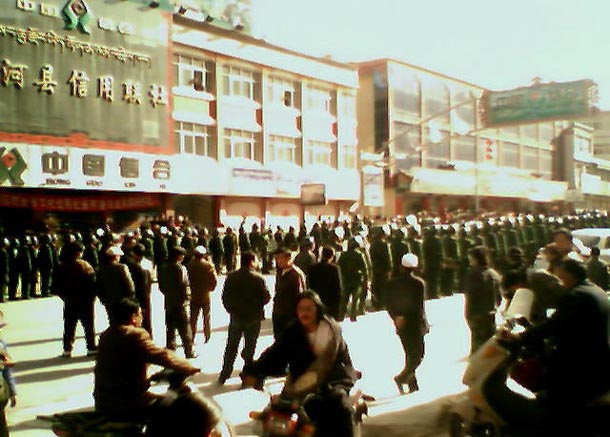Dharamshala - Over a hundred Tibetans in the Amdho Ngaba region of Tibet shouted slogans during a protest against Chinese rule on the 23rd of March.
The protesters shouted slogans demanding a free Tibet and the return of Tibetan spiritual leader His Holiness the Dalai Lama to Tibet. Sources said the demonstration was cracked down by the armed Chinese military forces and police after the protesters circled the market and streets three times.
Lobsang Yeshe and Kanyag Tsering, who live in Dharamshala, India, told The Tibet Post International on Tuesday that the Chinese arrested at least eight of the protesters in the county of Zamthang, Ngaba Region, Eastern Tibet: a schoolteacher named Phalkho; 40 years old, Dorjee; 35 years old, Ador; 35 years old, Woesal Dorjee; 28 years old, and four other unnamed Tibetans were also arrested.
Afterward, hundreds of Chinese armed forces were deployed in the village, carefully watching for further disruptions or turbulence. The police stayed until the 28th of March, questioning people regarding who instigated the protest.
At 12:00 midnight, another Buddhist monk of Kirti Monastery called Tenzin was arrested by the police. Tenzin is 21 years old, the son of Dronkar and Sonam. The police did not give a reason for his arrest, and he was still in police custody on the 27th. After the protest at the monastery, the police have been present with a police dog every night since.
On the 24th, many police arrived in a village called Tawa (upper), Ngaba county, and had a meeting with the local villagers. They said all the village people must look in the Kirti Monastery and tell the police what is happening regarding further protests. The police said that if the villagers did not go to the monastery to observe the monks and help the police, each would be fined 30 yuan a day.
The police also warned the villagers not to involve in any kinds of protests against the government as the monks from Kirti Monastery did. 'Members of the public and monks are very different,' argued the police. They added:
The Chinese officials told the villagers that 'the government has helped them many times, and in the future, it also has plans to help villagers.' "Nobody should be burning themselves, and there are no issues. The monks have very good conditions, but simply don't want to enjoy these and burn their bodies for no good reason," the officials added.
The monks from Kirti monastery have formed a group for self-immolation protest; they have promised that they will set fire to themselves to protest against Chinese rule over Tibet. But, the police intend to break this group of monks, with the help of the villagers.
However, the villagers went to the monastery to look for the monks in the morning. Instead of observing the monks, they offered prayers and circled the monastery in the morning and evening. The Chinese police gave 30 yuan to each of the villagers after the event; the police also took photos of participants and covered them with video recordings.


![Tibet has a rich history as a sovereign nation until the 1950s when it was invaded by China. [Photo: File]](/images/stories/Pics-2024/March/Tibet-Nation-1940s.jpg#joomlaImage://local-images/stories/Pics-2024/March/Tibet-Nation-1940s.jpg?width=1489&height=878)


















